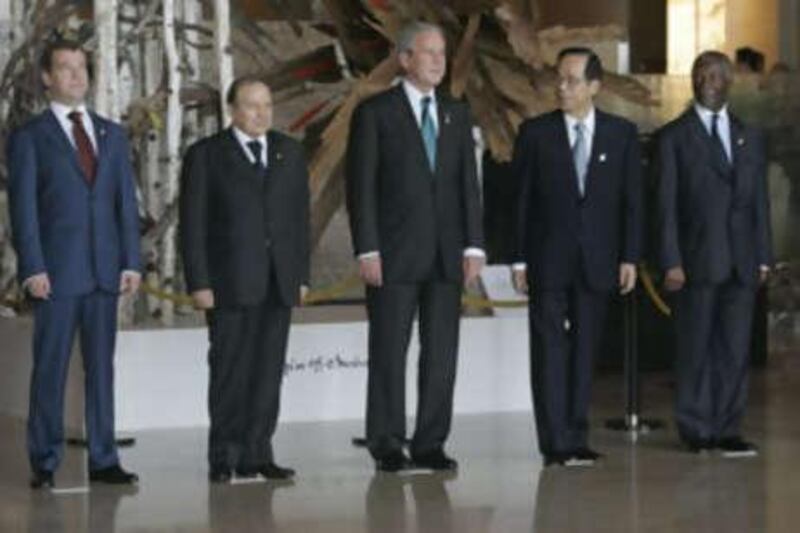TOYAKO, JAPAN // Leaders of the world's richest nations today opened a summit aimed at battling ever increasing oil and food prices, as pressure mounted on them to live up to their pledges to help Africa. Leaders including the US president George Bush gathered in the secluded spa resort of Toyako in northern Japan for a three-day session, with seven African leaders joining them on the first day to take up the plight of the continent. Riot police with shields stood under pouring rain and blocked some 50 protesters who had camped out in the meadowlands from getting anywhere near the plush hotel where the world's top leaders were meeting.
The closest that demonstrators got was the other side of sapphire-blue Lake Toya, where they shouted slogans in the improbable hope that leaders on the hilltop on the other side would hear them. The European Commission chief Jose Manuel Barroso set the tone for the meeting by proposing the creation of a US$1.57 billion (Dh5.7bn) EU fund to fight hunger and help farmers in poor countries with seeds and fertiliser. Food prices have nearly doubled in three years and set off riots in parts of the developing world, which are also being hit hard by record oil prices.
In the closed-door session, African leaders pushed for the Group of Eight nations to make good on aid promises, saying the continent was bearing the brunt of rising food prices, a Japanese official who was present said. "Because of the recent surge in food prices, African agriculture's supply and demand is not balanced and we would like the G8 to fully support our cause," the official quoted African delegates as telling G8 leaders. Pope Benedict XVI also called on G8 leaders to focus on the world's weakest and poorest people, as they are "more vulnerable now because of speculation and financial turbulence and their perverse effects on the prices of food and energy".
But aid groups said that some of the G8 nations - Britain, Canada, France, Germany, Italy, Japan, Russia and the United States - were walking away from earlier commitments. The club of rich nations promised in 2005 to boost aid to Africa by a further $25bn by 2010. But UN and African Union figures indicate that only less than a quarter of that amount has been forthcoming. The Oxfam charity said that Canada in particular was working to water down aid pledges, with their position backed by France and Italy.
"We can't let them step away from their promises," the Oxfam activist Max Lawson said. "For rich countries this is peanuts. For African countries this is life or death." The G8 was joined for Monday's so-called outreach session on Africa by the leaders of Algeria, Ethiopia, Ghana, Nigeria, Senegal, South Africa and Tanzania. The G8 leaders were expected to make soaring oil prices the focus of their main session tomorrow, which have imperilled global economic growth by stoking inflation, prompting warnings by aid groups not to forget Africa.
In Mali, hundreds of activists from around the world gathered in the dusty town of Katibougou for a poor people's summit organised to counterbalance the G8. G8 leaders also pushed for action on Zimbabwe, where President Robert Mugabe secured a sixth term last month in a widely condemned election in which his only rival dropped out faced with violence. "I care deeply about the people of Zimbabwe. I am extremely disappointed in the election, which I labelled a sham election," Mr Bush said after a meeting with the Tanzanian president Jakaya Kikwete, the head of the African Union.
The UN Secretary General Ban Ki-moon said he would also hold talks with African leaders on the Zimbabwe crisis and press for movement in the fight against climate change. "I hope the US ultimately should take [on] this leadership role. This is what the whole international community expects of the United States," Mr Ban said. The United States is the only major industrial nation to shun the Kyoto Protocol as it pushes for more commitment from developing nations. Last year's G8 summit agreed that the leaders would "consider seriously" at least halving carbon emissions by 2050. *AFP





